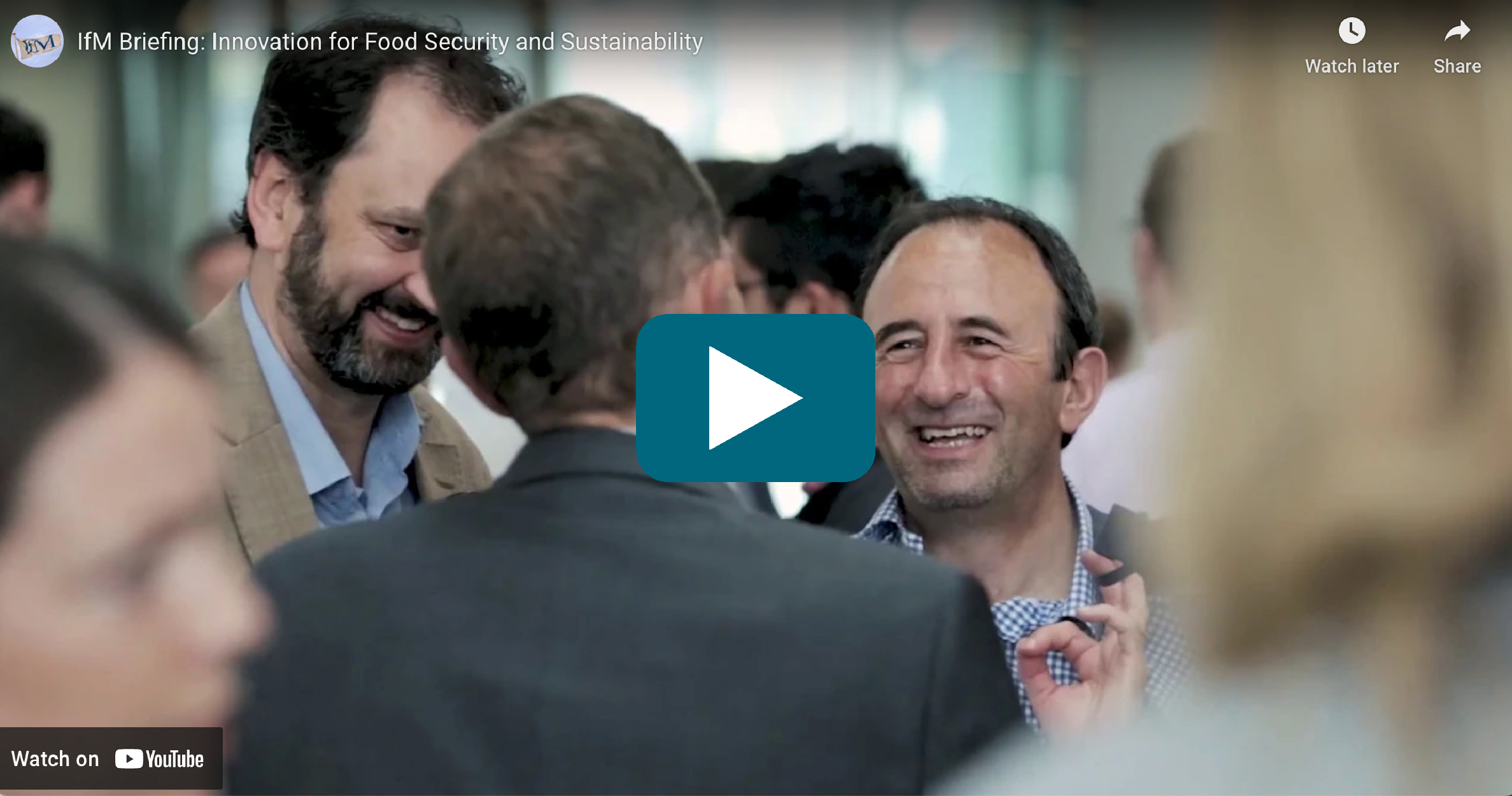Innovation for food security and sustainability explored at first IfM Briefing

How can the food industry innovate effectively to improve food security and sustainability? This was the question addressed by speakers at the recent IfM Briefing in London on 25th June 2019, the first in a new series of Briefings from the IfM.
The focused, two-hour Briefing—co-located with the Food Tech Matters conference—brought together stakeholders from across the food sector, including industry practitioners, policymakers and researchers.
The talks and panel discussion covered research and industrial case studies. Speakers considered how manufacturers can innovate effectively, harness technology, and implement change for sustainability, with examples and case studies from industry.
Video: event summary featuring introduction from Professor Steve Evans on the challenges facing the fodo sector.
How is open innovation stimulating sustainability in the food sector?
Professor Tim Minshall (Dr John C. Taylor Professor of Innovation, and Head of the IfM) opened the first of four talks by explaining the concepts of ‘open innovation’, a paradigm that assumes that firms can and should use both internal and external ideas and paths to market. He explained how and why a more collaborative approach to innovation can be beneficial for organisations.
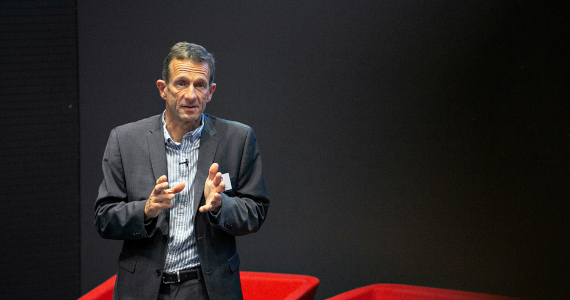
Illustrating how these research concepts have been put into practice, Dominic Oughton (IfM Industrial Associate) talked about the Open Innovation (OI) Forum, convened and facilitated by the IfM, which brings together organisations across the food and drink sector. The OI Forum includes major multinationals, spanning the supply chain from ingredients and materials through processes and technology, to brand owners and retail. Dominic provided insights into how the consortium’s meetings help to stimulate innovative thinking, enabling members to discuss ideas and share best practice on innovation strategy. The OI Forum pitching event provides a platform for start-ups in the sector to present to large companies, giving a means of connecting different size companies for nurturing innovation.
How sustainable are our online food shopping baskets?
In the next talk, Dr Jag Srai (Head of the IfM’s Centre for International Manufacturing) explored the impact of our changing habits as consumers in how we purchase food, focusing on the growth of e-ecommerce, and the implications across supply chains.
Within developed markets, Jag considered whether the benefits to consumers of the convenience and speed of online grocery shopping are environmentally sustainable. Digital platforms are providing radical new ways to connect consumers, retailers and producers, and new opportunities through personalised offers to target individual consumers. But can this technology be harnessed to result in a more informed shopping basket and less waste?
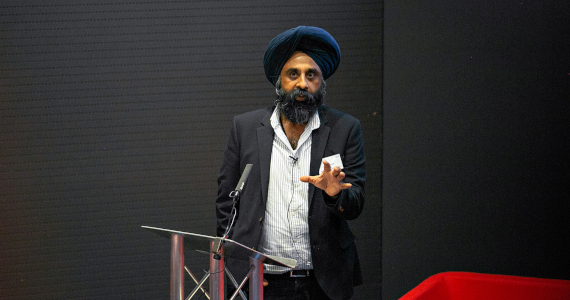
In developing markets, how can food production be supported in a sustainable way? Jag discussed how farmers in areas such as the Punjab (where he is currently working on a major collaborative research project, TIGR2ESS) can be supported towards economic development without compromising available resources, including technology solutions such as precision agriculture.
Jag pulled these together with a look at global food supply chains, posing questions for how the sector works towards capturing value and ensuring authenticity and quality, as well as using resources sustainably.
How can the food sector use data to build more resilient systems?
Dr Mukesh Kumar (leading the IfM’s Industrial Resilience research group) was the next speaker, addressing how data can be used in the food sector for building more resilient systems, to provide better nutrition. He gave some stark statistics on global nutrition and food safety:
- The food supply chain is worth $8 trillion and employs over 1 billion people.
- $680 billion worth of food is wasted, despite widespread malnutrition with 462 million being underweight and 1.9 billion overweight.
- 600 million people fall ill every year and 420,000 die from contaminated food.
Mukesh provided insights into a research project on waste in the potato supply chain, where an astonishing two-thirds of potatoes are wasted. He talked about uncovering where waste happens and why, and using data to analyse and monitor waste hot-spots.
To conclude, Mukesh posed the question of how a paradigm shift in food production might take place to enable more sustainable, resilient production for better global nutrition. Part of the answer, he suggested, may lie in more localised production.
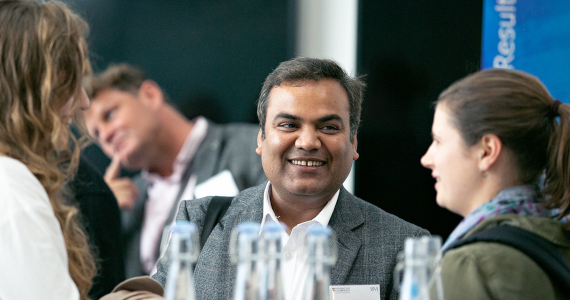
What examples of radical approaches to sustainability have been successful for manufacturers?
The final talk of the evening was from Professor Steve Evans (Head of the IfM’s Centre for Industrial Sustainability) and Gary Punter (Visiting Fellow at the IfM, formerly Head of Innovation at AB Sugar).
Steve opened with a key question: How efficient could most manufacturers become at reasonable cost? If manufacturers moved just half way from their current resource usage towards the usage of the most efficient companies in their own industry, research indicates that the impact in manufacturing would be 12% increased profit, 15% more jobs and 5% reduction in greenhouse gas emissions. He discussed recent examples of improved efficiency from Toyota and from a jeans manufacturer.
Steve asked ’How good is good?’ – how do manufacturers know what is possible for them to achieve in terms of improved use of resources? He argued that zero waste to landfill is an old target, and that 7% energy reduction year-on-year must become the new goal.
With a powerful case study illustrating how this can work in practice, Gary explained how AB Sugar reconstructed its Wissington plant with a relentless focus on efficiency and no waste. He outlined his challenge and aspiration to spread ‘no waste’ and ‘agile’ to other sectors and countries.
The evening was rounded off with a panel discussion, with thought-provoking questions from the audience such as what policymakers should prioritise to stimulate sustainability in food supplies.
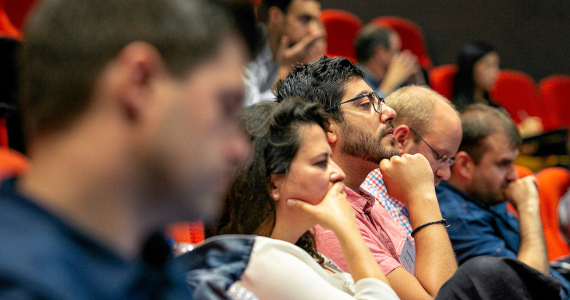
Future Briefings
Future IfM Briefings will cover a range of topics for different audiences, including policymakers, academics and industrial decision makers in manufacturing.
Stay informed about future IfM Briefings by signing up to receive our newsletter 'IfM Insights'.
 You may also be interested in our Problem Solvers podcast with Steve Evans and Gary Punter on sustainability in the food industry.
You may also be interested in our Problem Solvers podcast with Steve Evans and Gary Punter on sustainability in the food industry.


